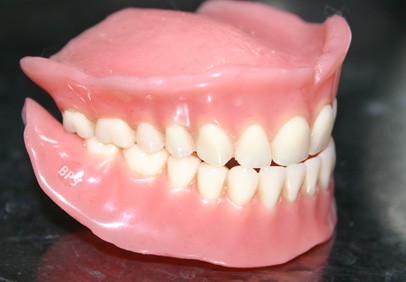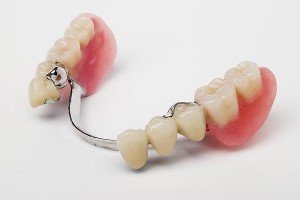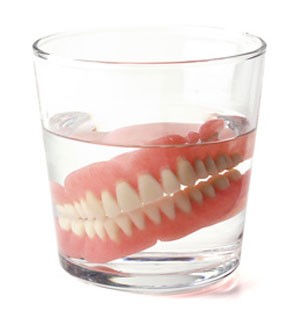Dentures have been one of the most popular solutions for replacing missing teeth for decades. This guide outlines the different types of dentures, including how much they cost and the advantages and drawbacks of each. We hope this will help you decide what option is best for your situation.
Contents
- How much do they cost?
- Factors that affect the cost
- What are dentures?
- Types of dentures
- Benefits and problems
- Caring for dentures
- Denture alternatives
- What to read next
How Much Do Dentures Cost?
| Full Set of Dentures | |
|---|---|
| Basic | $600 to $1000 |
| Mid-Range | $1000 to $2000 |
| Premium | $4000 to $8000 |
| Partial | $700 to $1800 |
| Implant Supported | $30000 to $50000 |
The cost of dentures can vary considerably so the figures below are just a guideline. In countries where dentures can legally be made by denturists, the fee guides are typically published by denturist associations. In countries where this service is provided by dentists, fee guides are usually published by dental associations. Some governments provide additional coverage for seniors purchasing dentures.
Basic Dentures
Basic dentures can cost as little as $300 to $500, or from $600 to $1,000 for a full set of upper and lower teeth, making them a cost-effective choice particularly for anyone seeking a temporary solution to tooth loss.
These dentures tend to be cold-cured, meaning the acrylic used does not need to be heated in order to be cured, reducing the time required to make the denture. In comparison, mid-range and premium dentures have heat cured acrylic bases that are stronger and more durable.
Basic dentures typically use less expensive denture teeth that may look slightly artificial and the denture could have a limited warranty and will not last as long as a more expensive model.
Mid-range Dentures
Mid-range dentures can cost between $500 and $1,500 per denture, or between $1,000 and $3,000 for a complete set. Mid-range dentures are more personalized and will include much more natural looking teeth and are more durable than basic dentures.
Warranties can range from 90 days to one or two years. In some cases, there will be a money back guarantee and the price quoted may include subsequent adjustments to the dentures.
Premium Dentures
Premium dentures can cost between $2,000 and $4,000 for an upper or lower plate, or from a $4,000 to $8,000 or more for a complete set. These dentures will use the highest quality denture teeth as well as top-quality acrylics to replicate gum tissue.
The technician making the denture will spend more time ensuring the acrylic baseplate accurately represents the shape of the gums and teeth are positioned to create an individual and aesthetically pleasing appearance.
A premium denture will likely come with a warranty against chipping and cracking, covering the denture for between 5 to 10 years and the price usually includes several follow-up visits to adjust the fit.
Removable Partial Dentures
A removable partial denture starts at around $300 to $500. The average cost ranges from $700 to $1,800. Partial dentures with a metal framework can cost between $2,000 and $4,000 and may include metal clasps or precision attachments that fit onto crowns or bridges to help hold the denture firmly in position. The use of precision attachments does require natural teeth to be crowned, adding to the overall cost of this procedure.
Full Set of Fixed (Implant Supported) Dentures
Implant supported dentures are typically supported by 2 to 6 dental implants. Treatment may cost from $15,000 and $24,000 or more for an upper or lower implant supported denture, depending on the number of implants required and the type of implants used. For example, mini dental implants are typically much cheaper.
Costs also depend on the denture materials used, as sometimes it may be possible to modify an existing denture to fit onto the dental implants. A full set of upper and lower implant supported dentures typically costs between $30,000 and $50,000.
Cost to Extract Teeth
Often a dentist will need to remove any badly damaged teeth before making a denture. A straightforward single tooth extraction will cost $75 to $450 while a surgical extraction can cost from $150 to $650.
Factors That Affect the Cost Include:
- Location of the dentist providing the treatment
- Type of dental insurance you have
- Complexity of the denture required
- Additional procedures such as tooth extractions or surgery to reshape bony ridges
- Materials selected to make the denture
- Type of warranty provided
Cost of Dentures in Other Countries
| Country | Low | High |
|---|---|---|
| Albania | $260 | $764 |
| Australia | $746 | $1,937 |
| Brazil | $2,000 | $1,796 |
| Bulgaria | $184 | $315 |
| Costa Rica | $527 | $885 |
| Croatia | $522 | $1,020 |
| Egypt | $340 | $910 |
| Hungary | $568 | |
| India | $188 | $515 |
| Ireland | $398 | $1,932 |
| Italy | $1,312 | |
| Jordan | $282 | $747 |
| Lebanon | $1,000 | $1,350 |
| Malaysia | $189 | |
| Malta | $626 | |
| Mexico | $394 | $653 |
| Nepal | $23 | $171 |
| Philippines | $187 | $569 |
| Poland | $285 | |
| Singapore | $124 | $620 |
| South Africa | $269 | $654 |
| Spain | $827 | $1,111 |
| Thailand | $218 | $727 |
| Turkey | $863 | $1,153 |
| United Arab Emirates | $1,362 | |
| United Kingdom | $1,035 | |
| Vietnam | $167 | $913 |
What are Dentures?

A denture is a removable prosthesis that can replace one or more missing teeth, restoring your smile and your ability to eat certain foods. In addition to making eating easier, dentures will help you talk clearly and when multiple teeth are missing provides valuable support for your facial muscles and structures. They are held in place via suction or dental adhesive and can be easily taken out for cleaning and are best removed at night to give the gum tissues a chance to recover.
They consist of denture teeth that are normally made from hardwearing plastic, but which may also be made from high quality ceramic. The teeth are supported by a base of gum colored acrylic. Modern denture teeth can closely resemble natural teeth and are available in a huge variety of shapes, sizes and colors. The gum colored acrylic also comes in a number of different colors to create a more natural appearance.
Types of Dentures
Full Dentures
Full dentures are useful for patients who have lost all their natural teeth in their upper or low jaw, or both. They help restore the correct facial dimensions and ensure the wearer can eat and speak normally.
Partial Dentures

Partial dentures replace one or more natural teeth and are ideal for anyone who does not wish to have dental implants or a dental bridge. These dentures are removable and are held in place by the natural teeth or with clasps that fit around existing teeth. Precision attachments may also be used to secure partial dentures, where the denture will clip onto an attachment connected to a crown or bridge. Partial dentures are made from acrylic but their base may be strengthened with metal.
Conventional Dentures
This is a removable denture that is fabricated several months after the natural teeth have been extracted, once the tissues have finished healing. Immediately after natural teeth are removed, the gums and jawbone undergoes a period of healing where the tissues will change shape. Waiting for these tissues to fully heal helps ensure that conventional dentures will fit properly, with few adjustments required.
Immediate Dentures
Immediate dentures are placed as soon as natural teeth are extracted so there is no need to be without teeth during healing. The immediate denture will have been pre-fabricated using models and jaw measurements taken during a previous visit to the dentist. The advantage of an immediate denture is that you will be able to eat relatively normally and to speak more easily. However, the gums and jaw will change shape during the healing process so it may be necessary to have an immediate denture relined or adjusted during this period.
Benefits and Problems
Benefits
- Improved appearance. Dentures can help increase self-confidence and self-esteem, replacing missing teeth or teeth that may have been worn or decayed, while providing the correct support for the cheeks and lips.
- Improved ability to eat and speak. Properly made dentures can help improve speech and enable patients to comfortably eat a greater variety of foods.
- Affordability. Dentures tend to be the most affordable solution for replacing missing teeth and treatment is the least invasive option.
Problems
- Difficulty eating certain foods.While dentures can restore a person’s ability to eat, certain foods, particularly those that are hard or sticky can still present a problem. Eating these foods could cause pain, may dislodge the dentures or will even risk breaking them.
- Difficulty speaking. Initially dentures can cause problems with speech. Patients may find their dentures click or whistle. These issues generally disappear once a patient becomes accustomed to wearing their dentures.
- Discomfort. Dentures can feel very strange initially and although patients may soon get used to them, the overall comfort and fit of this appliance can be an issue. This can remain a problem, particularly as the gums and jawbone will change shape over time, increasing the likelihood of dentures becoming ill-fitting.
- Care and maintenance. Dentures must be kept meticulously clean to maintain the health of the gums. They can also be quite fragile and if broken must be professionally mended.
Caring for Dentures

Dentures are quite fragile and will break if dropped so try to handle them over a basin of water or a clean towel. It’s important to remove your denture for daily cleaning. Use a denture brush as this will be softer than an ordinary toothbrush which is too hard and likely to damage your denture. Clean your denture with mild dish soap or a cleanser specifically designed for dentures. Ordinary toothpaste and household cleaners are much too harsh and could scratch the surface of your denture. Don’t try to sterilize your denture with boiling water as the heat could distort it. Once it is clean and while it is not being worn, soak it in a proprietary cleaning solution or in plain water to help keep it fresh and to maintain its shape.
Denture Alternatives
Dental bridges are a possible alternative treatment to a partial denture. A bridge is attached to adjacent teeth and it’s important these teeth are strong and healthy enough to support the restoration.
Dental implants are self-supporting, using titanium posts that are inserted into the jawbone to hold a crown, bridge or implant supported denture. Both of these options are more expensive than dentures but can offer better aesthetics and a more permanent and stable solution to tooth loss.
What to Read Next
- Dental Implants vs. Dentures
- How to Much Do Dental Implants Cost?
- What Are Mini Dental Implants?
- All-on-4 Dental Implants Cost & Procedure
Over to You
Considering getting dentures or already have them? Let us know in the comments how much you paid for them and how everything went!
I just had my upper teeth pulled and they placed a denture in the same day. Although I love the Dentist and staff, I am extremely unhappy about the fact that they never gave me a choice of what kind of dentures or what quality grade I wanted. I have excellent insurance and up to $2,400 per year in a savings account for dentures. I wanted top of the line dentures and I thought I would be shown diagrams and illustrations to ask me what kind And the price point I wanted. Does that part come later with adjustment? My immediate dentures are small and short. I have monkey mouth but my dentist said that they can fix that. I am confused about what little I was told or asked before the procedure. The only thing I wanted was a diagrams asking me what my expectations were and how much I was going to pay or was willing to pay. Is this standard? Are the first immediate dentures just for a short time period until they make me another set? I just assumed that this part was coming so I didn’t say anything. But I still have almost $2,200 left in addition to my insurance that I can use each year toward dentures. Am I expecting too much?? I HOPE SONEONE WILL ANSWER ME. THANKS
I paid $5,000.00 for Dentures @ Aspen Dental and the assured me they could make them fit before I had them pulled. They will not stay in at all. I have
tried all brands of glue . Could someone respond if they have had the implants done to their Dentures to hold them in place. Do they fit tightly with the Implants placed on the Denture and are you able to wear them without any other assistance ? Does the food still get under them when you eat?
Also would appreciate approximate cost to get uppers & lowers fitted with Implants and does it take more than 4 Implants on each set of Dentures?
I had my teeth removed because of constant dehydration & dry mouth due to kidney disease, and inability to absorb right nutrients needed .. they decided to pull all my teeth, I tried to ask them to save them maybe with caps, make a partial? But because of my medical they could only pull them and make false top and partial bottom, it’s said because they pulled at least 12 good teeth. But my medical has a inclusion in their contract that provider is not allowed to tell us offer us or inform us of anything that isn’t covered by our medical. Even if we are willing to pay the cost.
Sometimes your better off saying you have none to a couple to see what they would suggest as options?
Now because I had none I recieved what I feared the most dentures that look as bad as my mother’s did. All porportioned to look totally unnatural. Yes I was allowed to give my opinion at visit with wax predenture.
Yet it was obvious dentist wasn’t happy about it?
They set it up so you can make any changes, and then say well he did the best he could for you. What more would you have him do?
I told her 3 xs I didn’t want the teeth perfect. It’s a big giveaway, my teeth weren’t bad but not perfect front tooth protruded slightly, but noticably over other front teeth.. this is going to be quite noticable with these perfectly ugly lined up teeth.
I thank my dentist, I love her, but her hands are tied.
Your false teeth are such a improvement! They look so much more natural. And you used white which dentist doesn’t recommend nc it’s not natural.. lol
One woman in her 70’s image shocked me because of the improvement over other dentures.
That picture says a 1000 words our medical doesn’t want us to hear.
Thank you for your time,
Rita